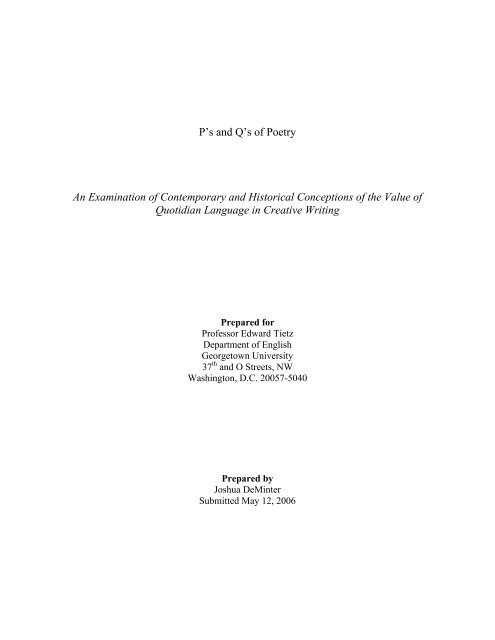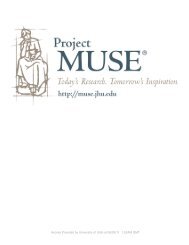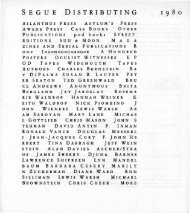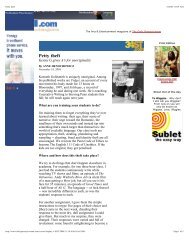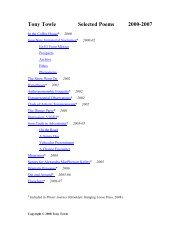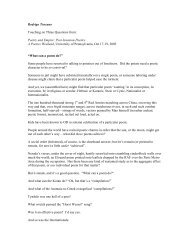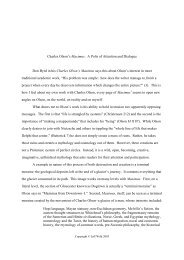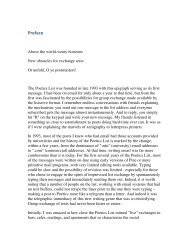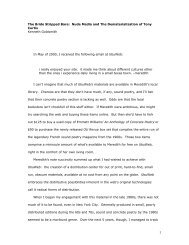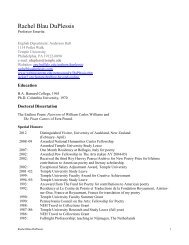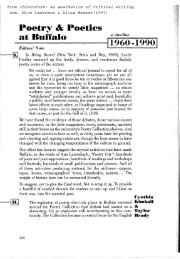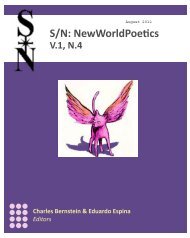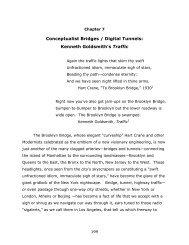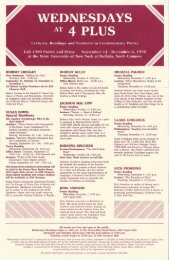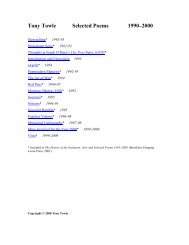P's and Q's of Poetry - Electronic Poetry Center
P's and Q's of Poetry - Electronic Poetry Center
P's and Q's of Poetry - Electronic Poetry Center
Create successful ePaper yourself
Turn your PDF publications into a flip-book with our unique Google optimized e-Paper software.
P’s <strong>and</strong> Q’s <strong>of</strong> <strong>Poetry</strong><br />
An Examination <strong>of</strong> Contemporary <strong>and</strong> Historical Conceptions <strong>of</strong> the Value <strong>of</strong><br />
Quotidian Language in Creative Writing<br />
Prepared for<br />
Pr<strong>of</strong>essor Edward Tietz<br />
Department <strong>of</strong> English<br />
Georgetown University<br />
37 th <strong>and</strong> O Streets, NW<br />
Washington, D.C. 20057-5040<br />
Prepared by<br />
Joshua DeMinter<br />
Submitted May 12, 2006
DeMinter 2<br />
A growing chasm exists between the world <strong>of</strong> poetry <strong>and</strong> contemporary culture. As<br />
Christian Bok posited during a seminar hosted at Georgetown University, “<strong>Poetry</strong> has become<br />
the art form you do when you can’t do anything else.” In an attempt at self-preservation, poetry<br />
adopted an isolationist motif <strong>and</strong> now st<strong>and</strong>s as a cultural bubble enclosed upon a static image <strong>of</strong><br />
itself, a bubble whose surface tension restricts its form <strong>and</strong> serves as a surprisingly strong barrier<br />
between itself <strong>and</strong> the greater population. Some argue that the bubble has grown too small <strong>and</strong><br />
the forms that once kept it afloat have become stale <strong>and</strong> can no longer sustain its social altitude.<br />
Fortunately, these individuals supplement their accusations with tangible theoretic <strong>and</strong> creative<br />
treatises that hold the potential for not merely the perpetuation <strong>of</strong> poetry but the evolution <strong>of</strong> it.<br />
In an interview conducted by Erik Belgium for Readme, Kenneth Goldsmith remarked<br />
that, “<strong>Poetry</strong> is such a non-pr<strong>of</strong>it economy that it functions outside the general traffic <strong>of</strong> capital,”<br />
a grave missive in the light <strong>of</strong> the modern age’s capitalist sensibilities, best typified by the<br />
writing <strong>of</strong> Ayn R<strong>and</strong> Atlas Shrugged. In Atlas Shrugged, the character Francisco d’Anconia’s<br />
defense against the claim that “money is the root <strong>of</strong> all evil” adds devastating import to<br />
Goldsmith’s remark. Francisco argues that:<br />
Money permits you to obtain for your goods <strong>and</strong> your labor that which they are<br />
worth to the men who buy them, but no more… Money dem<strong>and</strong>s that you sell, not<br />
your weakness to men's stupidity, but your talent to their reason; it dem<strong>and</strong>s that<br />
you buy, not the shoddiest they <strong>of</strong>fer, but the best your money can find…Money<br />
will not buy intelligence for the fool, or admiration for the coward, or respect for<br />
the incompetent…Money is the barometer <strong>of</strong> a society’s virtue (R<strong>and</strong> 387).<br />
Francisco places a weighty value on money <strong>and</strong> those who posses it. If money <strong>and</strong> the system <strong>of</strong><br />
trade for “worthy goods” it promotes is a social barometer <strong>of</strong> virtue <strong>and</strong> societal value, then
DeMinter 3<br />
Goldsmith’s observation places poetry on the lowest spectrums <strong>of</strong> Francisco’ barometer <strong>and</strong> in<br />
clear congruence with Bok’s observation.<br />
Goldsmith’s statement that:<br />
<strong>Poetry</strong> generally is so <strong>of</strong>f the beaten track in this culture that if the producers <strong>of</strong> it<br />
don't set up the distribution channels, no one will. And since it lacks the capital<br />
<strong>and</strong> market <strong>of</strong> painting, it's <strong>of</strong> no use to museums who might actually be able to<br />
fund adventurous poetries which move along similar intellectual tracks as the art<br />
they're showing, (Belgium)<br />
imposes negation upon poetry if viewed from the capitalist mindset. In light <strong>of</strong> R<strong>and</strong>, poetry’s<br />
failed marketability is symptomatic <strong>of</strong> its remoteness from the capitalist ideals that influence<br />
mainstream society <strong>and</strong> furthermore serves as a denouncement by the masses <strong>of</strong> poetry’s societal<br />
value. An equally bleak image <strong>of</strong> the reception <strong>of</strong> poetry by the mainstream is found in Susan<br />
Stewart’s critical writing.<br />
Donald Wesling argues that Stewart’s <strong>Poetry</strong> <strong>and</strong> the Fate <strong>of</strong> the Sense, is a “struggle<br />
against loss through grief, prayer <strong>and</strong> ceremony, <strong>and</strong> the restitutions <strong>of</strong> art.” In her critical piece,<br />
Stewart charts the steady decline <strong>of</strong> the poetic practice <strong>and</strong> reception in contemporary culture.<br />
During a seminar lecture given at Georgetown University, Stewart commented that poetry is not<br />
as popular in contemporary times as it once was <strong>and</strong> it was struggling to keep up with new<br />
technologies, but the works <strong>of</strong> conceptual poets was not going to restore it.<br />
Despite Goldsmith <strong>and</strong> Stewart’s theoretical divergences on how to reconstitute poetry,<br />
their conclusions on the place <strong>of</strong> poetry in contemporary culture are the same: it lives on the<br />
outskirts <strong>of</strong> society beyond the interest <strong>of</strong> an increasingly capitalistic culture. The congruent<br />
perceptions <strong>of</strong> the conceptualist camps, as represented by Goldsmith, <strong>and</strong> more traditional poetic<br />
notions, as typified by Stewart, regarding the decline <strong>of</strong> poetry are enough to merit pause,<br />
especially on as important a conversation as the place <strong>of</strong> poetry in the contemporary l<strong>and</strong>scape.
DeMinter 4<br />
Yet, not all is as harmonious as the initial agreement <strong>of</strong> the usually conflicting parties would<br />
suggest. It appears they have painted their l<strong>and</strong>scapes <strong>of</strong> poetry with different brushes that only<br />
have the illusion <strong>of</strong> similar conclusions, but the process <strong>and</strong> reasoning behind Stewart <strong>and</strong><br />
Goldsmith's finished products are significantly different <strong>and</strong> result in different prescriptions to<br />
reconcile poetry <strong>and</strong> the mainstream.<br />
Tension exists between Stewart <strong>and</strong> Goldsmith’s poetics regarding the value <strong>of</strong> the<br />
quotidian; Stewart expresses suspicion <strong>of</strong> quotidian language, whilst Goldsmith embraces it<br />
whole-heartedly. Goldsmith implicates quotidian linguistic patterns <strong>and</strong> vocabulary as<br />
rejuvenating elixirs <strong>of</strong> the English language. For Stewart, the quotidian carries with it the seeds<br />
<strong>of</strong> confusion <strong>and</strong> a depreciated poetic value that threatens the erosion <strong>of</strong> language, a view that is<br />
historically rooted in the annals <strong>of</strong> English.<br />
Jonathan Swift wrote on the erosion <strong>of</strong> English in a 1710 publication <strong>of</strong> The Tatler. In<br />
his letter, he claimed:<br />
There are some Abuses among us <strong>of</strong> great Consequence, the Reformation <strong>of</strong><br />
which is properly our Province…These two Evils, Ignorance, <strong>and</strong> want <strong>of</strong> Taste,<br />
have produced a Third; I mean the continual Corruption <strong>of</strong> our English Tongue;<br />
which, without some timely Remedy, will suffer more by the false Refinements <strong>of</strong><br />
Twenty Years past, than it hat been improved in the foregoing Hundred.<br />
In his letter, Swift vehemently rails against early experimentations with compound words like<br />
couldn’t <strong>and</strong> can’t, citing that these abbreviations are employed, “only to make one Syllable <strong>of</strong><br />
two, directly contrary to the Example <strong>of</strong> the Greeks <strong>and</strong> Romans…<strong>and</strong> a natural Tendency<br />
towards relapsing into Barbarity, which delights in Monosyllables, <strong>and</strong> uniting <strong>of</strong> mute<br />
Consonants; as it is observable in all the Northern Languages.” Swift’s discontent with the<br />
language <strong>of</strong> his day was not limited to new grammatical practices <strong>of</strong> conjunction however, but<br />
includes the incorporation <strong>of</strong> new words.
DeMinter 5<br />
In his article, Swift’s cites the expansion <strong>of</strong> the vocabulary <strong>of</strong> the English language to be<br />
another false refinement. “The third Refinement observeable in the Letter I send you,” writes<br />
Swift, “consisteth in the Choice <strong>of</strong> certain Words invented by some pretty Fellows, such as<br />
Banter, Bamboozle, Country Put, <strong>and</strong> Kidney, as it is there applied; some <strong>of</strong> which are now<br />
struggling for the Vogue, <strong>and</strong> others are in Possession <strong>of</strong> it.” Swift continues to state that, “I<br />
have done my utmost for some Years past, to stop the Progress <strong>of</strong> Mob <strong>and</strong> Banter; but have<br />
been plainly born down by Numbers, <strong>and</strong> betrayed by those who promised to assist me.” Not<br />
only did Swift view these “false refinements” as repugnant, but he also argues that:<br />
These are the false Refinements in our Style, which you ought to correct: First, by<br />
Arguments <strong>and</strong> fair Means; but if those fail, I think you are to make Use <strong>of</strong> your<br />
Authority as Censor, <strong>and</strong> by an annual Index Expurgatorius, expunge all Words<br />
<strong>and</strong> Phrases that are <strong>of</strong>fensive to good Sense, <strong>and</strong> condemn those barbarous<br />
Mutilations <strong>of</strong> Vowels <strong>and</strong> Syllables.<br />
Swift calls for a veritable crusade against these refinements <strong>and</strong> despite what lessons history has<br />
taught about the wisdom <strong>of</strong> crusades Swift’s call to arms still reverberates in our current culture<br />
in writers like Edwin Newman.<br />
Edwin Newman’s Strictly Speaking is a modern elongation <strong>of</strong> Swift’s earlier arguments.<br />
As Swift did, Newman begins his attack on current linguistic practices by focusing on evolving<br />
grammatical practices <strong>of</strong> word <strong>and</strong> phrase condensation. Newman turns to the federal<br />
government’s fuel conservation campaign, which “showed Snoopy on top <strong>of</strong> his dog house, flat<br />
on his back, with a balloon coming out <strong>of</strong> his mouth containing the words, ‘I believe in<br />
conserving energy!’ while below there was this exhortation: savEnergy,” (2). Newman<br />
sarcastically asserts that, “an entire letter e at the end <strong>of</strong> save was savd. In addition, an entire<br />
space was savd,” (2). Interestingly, the one <strong>of</strong> the reasons Newman <strong>and</strong> Swift are so vehemently
DeMinter 6<br />
set against the expansion <strong>of</strong> the English lexical database <strong>and</strong> linguistic practices is because they<br />
fear it is too receptive toward misrepresentation <strong>and</strong> confusion <strong>of</strong> interpretation.<br />
In Newman’s eyes, the conservation <strong>of</strong> letters <strong>and</strong> space is not noteworthy. Instead, he,<br />
like Swift, asserts, “Language is in decline. Not only has eloquence departed but simple, direct<br />
speech as well, though pomposity <strong>and</strong> banality have not,” (4). Direct speech <strong>and</strong> the conveying<br />
<strong>of</strong> ideas are essential to Newman’s concept <strong>of</strong> language; he finds the evolving condensations as<br />
impediments to underst<strong>and</strong>ing. “Language used to obfuscate or conceal or dress with false<br />
dignity is not confined to politics <strong>and</strong> did not burst upon us,” Newman argues. “In our time,<br />
however, it has achieved a greater acceptance than ever before, so that stiffness <strong>and</strong> bloat are<br />
almost everywhere,” (9). Swift was fearful <strong>of</strong> this same confusion <strong>of</strong> language more than 200<br />
hundred years earlier.<br />
In his analysis <strong>of</strong> the decline <strong>of</strong> language, Swift was also fearful <strong>of</strong> how emerging<br />
linguistic practices were muddling English’s ability to properly convey ideas. After providing a<br />
letter exemplary <strong>of</strong> the linguistic practices prevalent in his day, Swift’s article asks, “If a Man <strong>of</strong><br />
Wit, who died Forty Years ago, were to rise from the Grave on Purpose; how would he be able to<br />
read this Letter? And after he had got through that Difficulty, how would he be able to<br />
underst<strong>and</strong> it?” Stewart shares Swift <strong>and</strong> Newman’s concern with contemporary linguistic<br />
practices ability to articulate ideas.<br />
In Crimes <strong>of</strong> Writing, Stewart explores Edmund Husserl’ s Origins <strong>of</strong> Geometry as an<br />
analogy for comprehending language in general. Stewart quotes Husserl as stating that, “The<br />
important function <strong>of</strong> written, documenting linguistic expression is that it makes communications<br />
possible without immediate or mediate personal address, it is, so to speak, communication made
virtual,” 1 (143). Stewart sees, “the transformation <strong>of</strong> the intrapersonal (these forms in their<br />
transcendent objectivity being free, from the beginning, from an existence as ‘something<br />
DeMinter 7<br />
personal’) to the interpersonal, in that they are “objectively there” “for everyone” <strong>and</strong> hence are<br />
taken up by tradition,” in Husserl’s pure forms <strong>of</strong> communication (142).<br />
“In other words, (<strong>and</strong> other words have now become the problem),” Stewart writes, “The<br />
writing form itself comes to awaken its own familiar significations <strong>and</strong> thus take the place <strong>of</strong> an<br />
active experience with the ideality,” (143). The danger Husserl identifies here, <strong>and</strong> Stewart<br />
seems to support, is that “the originally intuitive life which creates its originality self-evident<br />
structures through activities on the basis <strong>of</strong> sense-experience very quickly <strong>and</strong> in increasing<br />
measures falls victim to the seduction <strong>of</strong> language,” (143). As a result, the personalization <strong>of</strong><br />
language impedes commutation to the point that the meanings behind expressions are no longer<br />
easily exchanged. The solution to which Stewart supports is univocity.<br />
Stewart indicates Husserl as the original proponent <strong>of</strong> univocity, citing that, “Husserl<br />
recommends not a return to the primacy <strong>and</strong> privacy <strong>of</strong> sense impressions, but a commitment to<br />
the rigors <strong>of</strong> univocity,” (143). “This occurs,” Husserl notes, “when one has a view to the<br />
univocity <strong>of</strong> linguistic expression <strong>and</strong> to securing…the results are to be univocally expressed,”<br />
(qtd. in Stewart 144). Stewart further postulates that, “the impossible balancing act <strong>of</strong> univocity<br />
is always a matter <strong>of</strong> assumed historicity, an assumed subjectivity, an assumed translatability,”<br />
(144).<br />
The balancing act <strong>of</strong> univocity insights “an anxiety regarding language’s ideal<br />
objectivity…This anxiety attaches itself to the problematic relation between subjectivity <strong>and</strong><br />
socialization, on the border between the megalomania <strong>of</strong> an inarticulate yet replete universe <strong>of</strong><br />
1 Edmund Husserl, “The Origin <strong>of</strong> Geometry,” trans. John P. Leavey, ed. David B. Allison (New York: Nicolas<br />
Hays, 1978). Original text.
DeMinter 8<br />
sensation <strong>and</strong> a fully articulated, lend themselves to taxonomy, <strong>and</strong> consequently empty universe<br />
<strong>of</strong> the purely symbolic,” (144). Furthermore, Stewart claims, “we must exam the grounds for<br />
this split as the impossibility enabling the very possibility <strong>of</strong> writing: ‘a subjectless<br />
transcendental field’ as ‘one <strong>of</strong> the conditions <strong>of</strong> transcendental subjectivity’.” Stewart finds that<br />
universal association, “enables the recognition <strong>of</strong> originality; it is an anxiety regarding ontology<br />
that establishes the grounds for an assumption <strong>of</strong> grounds,” (145). It is to traditional forms <strong>of</strong><br />
expression, linguistic patterns, <strong>and</strong> vocabulary that Stewart turns for universal association as<br />
tradition implies rooted meaning. It is for this reason that on a lexical level, Stewart parallels<br />
Swift <strong>and</strong> Newman, yet she steps beyond a rational argument for tradition into more qualitative<br />
affinities.<br />
During a lecture at Georgetown University with Stewart, an attendee exclaimed that<br />
Stewart’s poetry <strong>and</strong> “poetic language” in general, provided a welcome escape from the drudgery<br />
<strong>of</strong> the bureaucratic language her job inundated her with, to which Stewart agreed (Stewart,<br />
<strong>Poetry</strong> <strong>and</strong> the Feeling). Both the woman’s exclamation <strong>and</strong> Stewart’s consensus relegate<br />
languages ability to communicate to a secondary attribute in the face <strong>of</strong> some language’s (poetic<br />
language which relies on tradition rooted univocity) ability to elevate meanings <strong>and</strong> individuals.<br />
According to both women, the quotidian resides at the lowest thresholds <strong>of</strong> English’s linguistic<br />
hierarchy.<br />
The question <strong>of</strong> English’s linguistic hierarchy is not one limited to the realm <strong>of</strong> poetry,<br />
however, linguist linger over the lexical as well, though they seem to have reached a consensus<br />
still debated within the realm <strong>of</strong> poetry. Surprisingly, though their conclusions are strikingly<br />
different from Swift, Newman, <strong>and</strong> Stewart. Simply put, “linguists reject the view that<br />
languages attain a state <strong>of</strong> perfection at some point in their history <strong>and</strong> the subsequent changes
DeMinter 9<br />
lead to deterioration <strong>and</strong> corruption” (O’Grady 10). In fact, linguists have posited rebuttals for<br />
many <strong>of</strong> Swift, Newman, <strong>and</strong> Stewart’s claims that evolving quotidian practices are without<br />
merit <strong>and</strong> serve only to misdirect traditional linguistic practices.<br />
Where Swift found compound words to be false refinements that ask writers to, “cram<br />
one Syllable, <strong>and</strong> cut <strong>of</strong>f the rest; as the Owl fattened her Mice after she had bit <strong>of</strong>f their Legs, to<br />
prevent them from running away; <strong>and</strong> if ours be the same Reason for maiming <strong>of</strong> Words, it will<br />
certainly answer the End, for I am sure no other Nation will desire to borrow them,” (Tatler).<br />
Compounds have undergone actual refinement, regulation, <strong>and</strong> codification. Furthermore,<br />
compounds have escaped the void <strong>of</strong> personalized meaning <strong>and</strong> have reached a state <strong>of</strong><br />
st<strong>and</strong>ardized <strong>and</strong> regulated universality.<br />
According to Contemporary Linguistics, “compounds are used to express a wide range <strong>of</strong><br />
meaning relationships in English,” (O’Grady 149) which can be subdivided into endocentric <strong>and</strong><br />
exocentric characteristics. “In most cases, a compound denotes a subtype <strong>of</strong> the concept denoted<br />
by its head (the rightmost component). Thus,” Contemporary Linguistics contends, “dog food is<br />
a type <strong>of</strong> food, a cave man is a type <strong>of</strong> man…” (O’Grady 149). In the case <strong>of</strong> exocentric<br />
compounds, “the meaning <strong>of</strong> the compound does not follow from the meanings <strong>of</strong> its parts in this<br />
way. Thus, a redhead is not a type <strong>of</strong> head; rather, it is a person with red hair,” (O’Grady 149).<br />
Here, the “saved space” Newman found so exacerbating, is not with out purpose <strong>and</strong> does not<br />
impede effective communication <strong>and</strong> yet, these expressions have evolved <strong>and</strong> entered language<br />
through the expansion <strong>and</strong> gradual elevation <strong>of</strong> the quotidian into the heart <strong>of</strong> English’s lexicon.<br />
According to the linguist, language is continually evolving on a number <strong>of</strong> levels, from<br />
morphological changes to phonological shifts. Take that fact that, “during the M idle English<br />
period, many French words containing the suffix –ment (e.g. accomplishment, commencement)
DeMinter 10<br />
made their way into the language” <strong>and</strong> “eventually, -ment established itself as a productive suffix<br />
in English <strong>and</strong> was used with bases that were not <strong>of</strong> French origin (e.g., acknowledgement,<br />
merriment)” (O’Grady 307). What is interesting to note is that rather than confusing existing<br />
meaning within the language, the changes deposited new meanings that previously were absent<br />
in the language or found alternative expression for linguistic associations that became<br />
institutional <strong>and</strong> st<strong>and</strong>ardized. It is amongst the linguist that we find Goldsmith lurking.<br />
In an electronic interview with A.S. Bessa, Goldsmith wrote, “over the past decade we've<br />
seen language renewing itself at a remarkable rate. For example, compound words forming<br />
URLs have become common parlance (my favorite is Modell's: gottagotomos.com: It's<br />
something right out <strong>of</strong> Finnegans Wake).” Unsurprisingly, considering the historical trend<br />
surrounding discourses on the English lexicon, the condensation <strong>of</strong> words comes up, though this<br />
time not with dread but joy. In the interview, Goldsmith recalls first noticing this trend, “in the<br />
early 90s when rappers started slamming words together to create compounds like<br />
‘funkdoobiest’.”<br />
Goldsmith remarked that rap, especially the “Daisy Age” movement typified by Jungle<br />
Brothers <strong>and</strong> A Tribe Called Quest, was a rich lexical base that built on traditional structures<br />
linguistic patterns <strong>and</strong> musical forms, but also transcended them. “It was as if they took classic<br />
musique concrète <strong>and</strong> added beats to it, not to mention radical Burroughs-esque cut-up <strong>and</strong> John<br />
Oswald-like plunderphonic practices,” (Bessa). As Goldsmith put it, “it was an amazing<br />
confluence as modernism <strong>and</strong> pop culture worked together to stretch <strong>and</strong> twist the parameters <strong>of</strong><br />
language,” (Bessa).<br />
Goldsmith was not the first to look to Black forms <strong>of</strong> cultural expression <strong>and</strong> speech;<br />
poets have looked towards parochial <strong>and</strong> ethnic linguistic patterns for material for years. Two
DeMinter 11<br />
writers engaged in such linguistic structures <strong>and</strong> lexicons were Paul Laurence Dunbar during the<br />
end <strong>of</strong> the 19 th century <strong>and</strong> Zora Neal Hurston during the first half <strong>of</strong> the 20 th century. These two<br />
figures are particular interesting comparisons to Goldsmith because they like he, were inspired<br />
by Black linguistic patterns, although they focused on provincial forms whereas Goldsmith<br />
focused more on urban patterns.<br />
Dunbar’s “Little Brown Baby,” is an excellent example <strong>of</strong> his fusion <strong>of</strong> parochial speech<br />
<strong>and</strong> traditional poetic structure. The poem begins:<br />
Little brown baby wif spa’klin eyes,<br />
Come to yo’ pappy an’ set on his knee.<br />
What you been doin’, suh-makin’s san pies?<br />
Look at dat bib—you’s ez du’ty ez me.<br />
Look at dat mouf—dat’s merlassess, I bet;<br />
Come hyeah, Maria, an’ wipe <strong>of</strong>f his han’s.<br />
Bees wine to ketch you an’ eat you up yit,<br />
Bein’ so sticky an sweet—goodness lan’s! (1223)<br />
The musicality <strong>of</strong> the southern dialect has been effectively transposed to print in these lines,<br />
though the translation from page back to tongue is not a task for the unprepared. The poem<br />
captures the persona <strong>of</strong> the southern father by capturing the very patterns <strong>of</strong> his speech. Yet, at<br />
the same time, Dunbar provides familiar poetic elements like clearly distinguished eight line<br />
stanzas, which each utilize an ABABCDCD rhyme pattern. He also regulates each line to ten<br />
syllables. Hurston uses the same blend <strong>of</strong> parochial language <strong>and</strong> traditional artistic<br />
representation in her short story “The Gilded Six-bits.”<br />
In “The Gilded Six-bits,” Hurston gives the characters, particularly Joe, distinctive<br />
southern dialect reminiscent <strong>of</strong> that used in Dunbar’s “Little Brown Baby”. In response to the<br />
questioning <strong>of</strong> Missie May, Joe replies, “Don’t be so wishful ‘bout me. Ah’m satisfied de way<br />
Ah is. So long as Ah be yo’ husb<strong>and</strong>, Ah don’t keer ‘bout nothin’ else,” (79). Again, by<br />
representing the unedited speech patterns <strong>of</strong> the regions her stories depict, Hurston imbues her
DeMinter 12<br />
work with a tangible persona that resonates with contemporary readers. Yet, she contains the<br />
language as well within traditional syntactical structures <strong>and</strong> unlike her characters, the narrative<br />
portions <strong>of</strong> her text do not end in prepositional phrases.<br />
Nearly a hundred year before Goldsmith found the quotidian infused into artistic<br />
expression, Hurston <strong>and</strong> Dunbar had already been executing it to a science, with results that<br />
fused tradition with the contemporary. Yet, where Dunbar <strong>and</strong> Hurston still adhered to<br />
traditional forms <strong>of</strong> artistic representation, Goldsmith’s notion <strong>of</strong> conceptual poetry asks for the<br />
ab<strong>and</strong>onment <strong>of</strong> those forms as well as receptivity to the quotidian. Soliloquy st<strong>and</strong>s out as<br />
Goldsmith’s publications most heavily invested in quotidian language, unedited, <strong>and</strong> free <strong>of</strong><br />
traditional poetic structures.<br />
In a review <strong>of</strong> Soliloquy, Doug Nufer states that, “this book is less refined than his earlier<br />
transcriptions…Yet Soliloquy is perhaps the purest example <strong>of</strong> Goldsmith’s transcription<br />
methodology,” <strong>and</strong> as such, it is the best example <strong>of</strong> Goldsmith’s methodology for infusing<br />
quotidian language into writing. Soliloquy is an unedited transcription <strong>of</strong> everything Goldsmith<br />
said in a week. According to its back cover, Soliloquy is “in the tradition <strong>of</strong> Andy Worhol’s A<br />
<strong>and</strong> David Antin’s talk poems” that “ups the ante on real speech as poetry.”<br />
The provincial slang <strong>and</strong> diction <strong>of</strong> Goldsmith’s New York life saturates the book. Take<br />
for instance an excerpt from a conversation Goldsmith had on the second day <strong>of</strong> the project:<br />
Hey! It’s SoHo pal! It’s so ho. Hah! Do I look like hell? You know you look<br />
dookey. Shit. You look like shiiiitttt. So what’s up, baby? How was Iggy? Was<br />
he? Huh. Really, I in other words, he hasn’t lost it, mmmm? Oh boy, When is<br />
the Füehrer’s birthday? It’s the 23 rd . (141).<br />
Though not as taxing on the tongue as some <strong>of</strong> Dunbar or Hurston’s southern dialects, the chaos<br />
<strong>of</strong> the language is almost overwhelming. The subject’s <strong>of</strong> sentences are elusive, thoughts are left<br />
unconcluded, <strong>and</strong> the language is saturated in variations <strong>of</strong> shit, all <strong>of</strong> which threaten the
DeMinter 13<br />
confusion <strong>and</strong> impediment to communication Stewart <strong>and</strong> her cohorts fear. “Sentences veer all<br />
over the place, crashing into fragments as they're jammed one after another into long stretches<br />
that break only at the end <strong>of</strong> the day,” (Nufer). Despite this threat, “Soliloquy leaves the reader<br />
with a convinced sense that language, no matter how un-artful, does the heavy lifting in our<br />
lives, <strong>and</strong> has encoded the entire registry <strong>of</strong> our being,” (Publishers Weekly).<br />
Molly Schwartzberg argues that, “redundancy is a kind <strong>of</strong> weariness, an exhaustion that<br />
in Goldsmith's case tilts over to a decadence” <strong>and</strong> that “many critics have noted that Goldsmith's<br />
recent books seem compellingly appropriate to our own fin de siècle moment.” Yet, “that<br />
moment <strong>of</strong> exhaustion,” she continues, “seems also to be a moment <strong>of</strong> epic: countering<br />
Goldsmith's calculated irrelevance/irreverence is the fact <strong>of</strong> his tomes' serious weight, both<br />
physical <strong>and</strong> conceptual.” Juxtaposed to Goldsmith’s tomes is the more conventional lexicon<br />
employed by Stewart in Columbarium.<br />
In Columbarium is not as restrictive in establishing parameters <strong>of</strong> “poetic language”, as<br />
Ray McDaniels cites, “there are contemporary references aplenty in Columbarium, <strong>and</strong> enough<br />
colloquial speech to save the lines from ever adopting the wide-eyed Gloria Swanson stare <strong>of</strong><br />
Importance!,” but there are contained <strong>and</strong> predominate by antiquated references <strong>and</strong> verbiage. In<br />
her poem “Forms <strong>of</strong> Forts”, she begins:<br />
Hay Fort<br />
A labyrinth. A pencil shaft <strong>of</strong> light<br />
wherever four bales couldn’t squarely meet.<br />
The twine tight, lifting as abrading.<br />
A twinge, the prickly collar rubbing<br />
a scratching rash along the forearm.<br />
The heaviness <strong>of</strong> the hay in the hot dark. (42)
DeMinter 14<br />
The poem has an elegant balance <strong>of</strong> language that spans both traditional <strong>and</strong> quotidian language.<br />
Even urban readers who have never seen bales <strong>of</strong> hay or traversed a labyrinth can relate <strong>and</strong><br />
underst<strong>and</strong> the images, because they are still resonant in our culture. The same conveyance <strong>of</strong><br />
meaning is not as easily accomplished in her poem O.<br />
In O, Stewart writes:<br />
Toi, toi, toi, said Peleus.<br />
Grieving, Hecuba<br />
barked like a dog.<br />
O said the woman<br />
who spoke only English,<br />
who cast an English<br />
zero out, a wreath<br />
on the battering waves.<br />
O the teeth clenched.<br />
O a fistful <strong>of</strong> hair. (68)<br />
Though the image <strong>of</strong> the woman’s spoken "O" battering on the waves is tangible, for many the<br />
reference to Hecuba <strong>and</strong> Peleus goes unmarked <strong>and</strong> misunderstood if understood at all. It<br />
threatens an adherence to what David Orr cites as the traditional perception that, “Academic<br />
poetry is intelligent but dull; non-academic poetry is dopey but exciting.”<br />
Although as Orr cites, “Stewart manages to convey a sense <strong>of</strong> risk that is no less<br />
energizing for being detached from the everyday world <strong>of</strong> hot dogs <strong>and</strong> bicycles <strong>and</strong> divorces,” it<br />
is questionable if her ability to excite the reader is more noteworthy for its ability to transcend a<br />
dependency “on citation either to Stewart's experience or the reader's own.” In his article for The<br />
Tatler, Swift expresses extreme distress at the prospect that if the educated dead <strong>of</strong> previous<br />
generations were to exam the literature <strong>of</strong> his day, they would be hard-pressed to underst<strong>and</strong><br />
what authors were discussing in their works. Yet, is their underst<strong>and</strong>ing really necessary<br />
considering they are not alive to underst<strong>and</strong> what is being written anyway <strong>and</strong> attempts to allow<br />
their underst<strong>and</strong>ing must come at the potential sacrifice <strong>of</strong> the underst<strong>and</strong>ing <strong>of</strong> the living.
DeMinter 15<br />
In his book, The Sacred Wood, T.S. Eliot cites that, “the dead writers are remote from us<br />
because we know so much more than they did. Precisely <strong>and</strong> they are that which we know,” but<br />
this was not a suggestion that writers blindly give into the “traditions” that have emerged around<br />
the knowledge <strong>of</strong> the dead writers. Eliot argues that, “if the only form <strong>of</strong> tradition, <strong>of</strong> h<strong>and</strong>ing<br />
down, consisted in following the ways <strong>of</strong> the immediate generation before us in a blind or timid<br />
adherence to its successes, ‘tradition’ should positively be discouraged.” He follows this<br />
assertion with the clever insight that, “we have seen many such simple currents soon lost in the<br />
s<strong>and</strong>; <strong>and</strong> novelty is better than repetition,” but his prescription is not a free license to ab<strong>and</strong>on<br />
all tradition as useless, it is merely a declaration that, “tradition is a matter <strong>of</strong> much wider<br />
significance,” including lexical traditions.<br />
Stewart expresses a similar suspicion <strong>of</strong> blind tradition in her book <strong>Poetry</strong> <strong>and</strong> the Fate <strong>of</strong><br />
the Senses, in which she cites that, “Emancipation is precisely what is promised falsely by the<br />
formalist method in its claim <strong>of</strong> literary transcendence <strong>and</strong> by any historicist method claiming<br />
contextual explanation” (253). Despite her concession that dated language is not liberating,<br />
Stewart’s work only lightly dives into the quotidian <strong>and</strong> there is a reluctance to allow it the same<br />
level <strong>of</strong> freedom exhibited in Goldsmith’s work that limits the accessibility <strong>of</strong> her work for<br />
contemporary audiences. Goldsmith is not without fault either however <strong>and</strong> his work is<br />
sometimes equally alienating to contemporary writers.<br />
In “Paragraphs <strong>of</strong> Conceptual Writing”, Goldsmith states that, “There is no reason to<br />
suppose, however, that the conceptual writer is out to bore the reader. It is only the expectation<br />
<strong>of</strong> an emotional kick, to which one conditioned to Romantic literature is accustomed, that would<br />
deter the reader from perceiving this writing” (Paragraphs on Conceptual Writing). Nonetheless,<br />
even Goldsmith himself must concede that antagonistic “emotional kick” his work threatens, is
not pleasantly received by many <strong>and</strong> <strong>of</strong>ten prohibits his expressions the quotidian from<br />
DeMinter 16<br />
registering <strong>and</strong> thus reconciling poetry with contemporary audiences. In order reconcile poetry<br />
<strong>and</strong> the mainstream, Goldsmith’s conceptual forms must be tempered by Stewart’s ability to link<br />
past <strong>and</strong> present while knitting a complex metaphor into a h<strong>and</strong>ful <strong>of</strong> lines (Orr).<br />
The balance <strong>of</strong> traditional language <strong>and</strong> the quotidian that will reconcile poetry to the<br />
mainstream is rooted in Eliot’s underst<strong>and</strong>ing <strong>of</strong> tradition <strong>and</strong>:<br />
involves, in the first place, the historical sense, which we may call nearly<br />
indispensable to anyone who would continue to be a poet beyond his twenty-fifth<br />
year; <strong>and</strong> the historical sense involves a perception, not only <strong>of</strong> the pastness <strong>of</strong> the<br />
past, but <strong>of</strong> its presence; the historical sense compels a man to write not merely<br />
with his own generation in his bones, but with a feeling that the whole <strong>of</strong> the<br />
literature <strong>of</strong> Europe from Homer <strong>and</strong> within it the whole <strong>of</strong> the literature <strong>of</strong> his<br />
own country has a simultaneous existence <strong>and</strong> composes a simultaneous order<br />
(Tradition <strong>and</strong> the Individual).<br />
Poet’s seeking to reconnect with contemporary audiences must retain the lessons <strong>and</strong> ideas <strong>of</strong><br />
past poets, but not be shackled by them.<br />
A man cannot own a word any more than he can own the air in the sky, none <strong>of</strong> it belongs<br />
to him alone, it is the birth right <strong>of</strong> all creatures. We cannot own <strong>and</strong> thus cannot contain our<br />
language; it exists outside <strong>of</strong> our control. Instead <strong>of</strong> fearing languages trajectory, whether it be a<br />
decline or improvement, or how its implementation differs from past conceptions, poets should<br />
exam <strong>and</strong> make use <strong>of</strong> the new mode <strong>of</strong> communication <strong>and</strong> metaphors evolutions in our<br />
language deposit into our collective lexical database. Poets like the deceased Dunbar whom can<br />
utilize both traditional poetics as well as contemporary language are those whose works will be<br />
most easily accessible to mainstream audiences.<br />
There is value in the challenges that Stewart’s academic allusions <strong>and</strong> archaic language<br />
invoke. As Eliot stated, “this historical sense, which is a sense <strong>of</strong> the timeless as well as <strong>of</strong> the<br />
temporal <strong>and</strong> <strong>of</strong> the timeless <strong>and</strong> <strong>of</strong> the temporal together, is what makes a writer traditional. And
DeMinter 17<br />
it is at the same time what makes a writer most acutely conscious <strong>of</strong> his place in time, <strong>of</strong> his<br />
contemporaneity,” (Tradition <strong>and</strong> the Individual). In his review <strong>of</strong> Stewart’s <strong>Poetry</strong> <strong>and</strong> the Fate<br />
<strong>of</strong> the Sense, Donald Wesling argues:<br />
There is a strong historical consciousness, evinced …<strong>of</strong> coherence distributed<br />
across Stewart's book: the transformations <strong>of</strong> Christian descriptions <strong>of</strong> the world,<br />
increasingly a struggle not to cast out the natural world from Cynewulf through<br />
the metaphysicals (Crashaw <strong>and</strong> Thomas Traherne) to Gerard Manley Hopkins,<br />
down to agnostic Thomas Hardy still half ready to credit a ghost in his poem "The<br />
Voice"; changes in relations between the senses <strong>and</strong> temporal abstraction that<br />
make it harder for us in the twenty-first century to apprehend the Renaissance<br />
aesthetics <strong>of</strong> the ratio, the numerical theologies <strong>of</strong> metaphysical mystics like<br />
Traherne, <strong>and</strong> the strictness <strong>of</strong> eighteenth-century rules <strong>of</strong> poetic meter.”<br />
Conversely, there is value in Goldsmith’s transcriptions <strong>of</strong> the unabashed quotidian<br />
lexicon, even if when “confronted with the matter <strong>of</strong> ‘real’ speech (not to mention its stammers<br />
<strong>and</strong> mumbles), we realize that we all sound a bit like Bush,” (Tapper). As Gordon Tapper’s<br />
noted, “Goldsmith could have generated an equally comprehensive snapshot <strong>of</strong> the language <strong>and</strong><br />
the cultural moment it embodies with a sound installation, filling our ears with his week-long<br />
Soliloquy. The translation from speech into writing was, evidently, pivotal, since it thereby<br />
produced something to see.”<br />
The contemporary quotidian is equally deserving <strong>of</strong> textualization <strong>and</strong> preservation as<br />
those lexical forms that have proceeded. <strong>Poetry</strong> can preserve the mainstream <strong>and</strong> imbue it with<br />
value <strong>and</strong> in respecting the malleability <strong>of</strong> language; poetry makes room for the incorporation <strong>of</strong><br />
new metaphoric <strong>and</strong> poetic potentials <strong>of</strong> modern language. At one point, all the traditional forms<br />
were not historic, but were rather innovative, on the forefront <strong>of</strong> linguistic expansion.<br />
Shakespeare’s sonnets are lexically rooted in the middle English <strong>of</strong> Beowulf, but also transcends<br />
<strong>and</strong> builds on it, yet none would argue for Shakespeare’s exclusion from poetry, for we are<br />
blessed with hindsight <strong>and</strong> see Shakespeare’s language, the language <strong>of</strong> Elizabethan English as
not an attack on the English lexicon but a metamorphosis <strong>of</strong> it. I for one wish to see our<br />
DeMinter 18<br />
linguistic practices recognized <strong>and</strong> added to the annals <strong>of</strong> history for future generations to build<br />
upon <strong>and</strong> am convinced that in doing so a bridge will be built between the past <strong>and</strong> present that<br />
will usher poetry back into to contemporary praise.
Works Cited<br />
DeMinter 19<br />
Bessa, A.B. “Exchanging E-mails with Kenneth Goldsmith: An Interview.” Brooklyn, New<br />
York. 1999. 23 Apr. 2006 <br />
Belgium, Erik. “Kenneth Goldsmith Interview.” Readme. Spring 2001. 25 Apr. 2006 <<br />
http://home.jps.net/~nada/kennyg.htm>.<br />
Bok, Christian. Seminar. Musical <strong>and</strong> Other Influences. Georgetown University Lannan <strong>Poetry</strong><br />
Series. Georgetown University, Washington. 28 Feb. 2006.<br />
Dunbar, Paul Lawrence. “Little Brown Baby.” Norton Anthology <strong>of</strong> <strong>Poetry</strong>. Ed. Margaret<br />
Ferguson, Mary Jo Salter, <strong>and</strong> John Stallworthy. New York: W.W. Norton <strong>and</strong> Company,<br />
Inc., 2005. 1223-1224.<br />
Eliot, T.S. “Tradition <strong>and</strong> the Individual Talent.” The Sacred Wood: Essays on <strong>Poetry</strong> <strong>and</strong><br />
Criticism. London: Methune, 1920. July 1996. 5 May 2006 .<br />
Eyerman, Ron. Cultural Trauma: Slavery <strong>and</strong> the Formation <strong>of</strong> African American Identity. New<br />
York: Cambridge University Press, 2001.<br />
Goldsmith, Kenneth. Soliloquy. New York: Granary Books, 2001.<br />
—, “Paragraphs on Conceptual Writing.” <strong>Electronic</strong> <strong>Poetry</strong> <strong>Center</strong>. 18 Nov. 2005.<br />
<br />
Hurston, Zora Neal. “The Gilded Six-bits.” The Best Short Stories by Black Writers 1899-1967.<br />
Ed. Langston Hughes. New York: Little, Brown <strong>and</strong> Company, 1967. 74-85.<br />
McDaniels, Ray. Rev. <strong>of</strong> Columbarium, by Susan Stewart. The Constant Critic. 7 May 2006<br />
.<br />
Newman, Edwin. Strictly Speaking. New York: Bobbs-Merril Co. Inc., 1974.
DeMinter 20<br />
Nufar, Doug. Rev. <strong>of</strong> Soliloquy, by Kenneth Goldsmith. Rain Taxi. Spring 2002. 5 May 2006<br />
.<br />
O’Grady, William, et. al. Contemporary Linguistics. New York: Bedford/St. Martin’s, 2001.<br />
Orr, David. Rev. <strong>of</strong> Columbarium, by Susan Stewart. <strong>Poetry</strong>. Aug. 2004. 3 May 2006 <<br />
http://www.poetrymagazine.org/books/contributing/24.html>.<br />
R<strong>and</strong>, Ayn. Atlas Shrugged. New York: Penguin Putnam Inc., 1992.<br />
Rev. <strong>of</strong> Soliloquy, by Kenneth Goldsmith. Publisher’s Weekly. 21 Jan. 2002. 30 Aug 2006<br />
.<br />
Schwartzberg, Molly. “Encyclopedic Novelties: Kenneth Goldsmith’s Tomes.” Open Letter: A<br />
Canadian Journal <strong>of</strong> Writing <strong>and</strong> Theory. “Kenneth Goldsmith <strong>and</strong> Conceptual Poetics.”<br />
Fall 2005. Ed. Barbara Cole <strong>and</strong> Lori Emerson. 27 Aug. 2008 <<br />
http://www.ubu.com/papers/kg_ol_schwartzberg.html><br />
Stewart, Susan. Crimes <strong>of</strong> Writing: Problems in the Containment <strong>of</strong> Representation. New York:<br />
Oxford University Press, 1991.<br />
—, <strong>Poetry</strong> <strong>and</strong> the Fate <strong>of</strong> the Senses. Chicago: University <strong>of</strong> Chicago Press, 2002.<br />
—, Seminar. <strong>Poetry</strong> <strong>and</strong> the Feeling <strong>of</strong> a Thought. Georgetown University Lannan <strong>Poetry</strong> Series.<br />
Georgetown University, Washington. 31 Jan. 2006.<br />
Swift, Jonathan. “Letter to Isaac Bickerstaff.” Tatler. 28 Sept. 1710. 30 Apr. 2006 <<br />
http://www.ourcivilisation.com/smartboard/shop/swift/bckrstff/chap2.htm>.<br />
Tapper, Gordon. “Kenny’s Goldsmith’s Soliloquy.” Rev. <strong>of</strong> Soliloquy, by Kenneth Goldsmith.<br />
Zingmagazine. 1997. 4 May 2006
Wesling, Donald. Rev. <strong>of</strong> <strong>Poetry</strong> <strong>and</strong> the Fate <strong>of</strong> the Senses, by Susan Stewart. Modern<br />
Language Quarterly. June 2004. 305-310. 7 May 2006.<br />
DeMinter 21<br />


